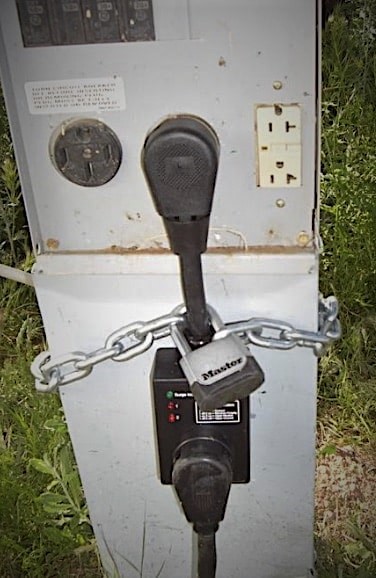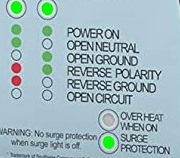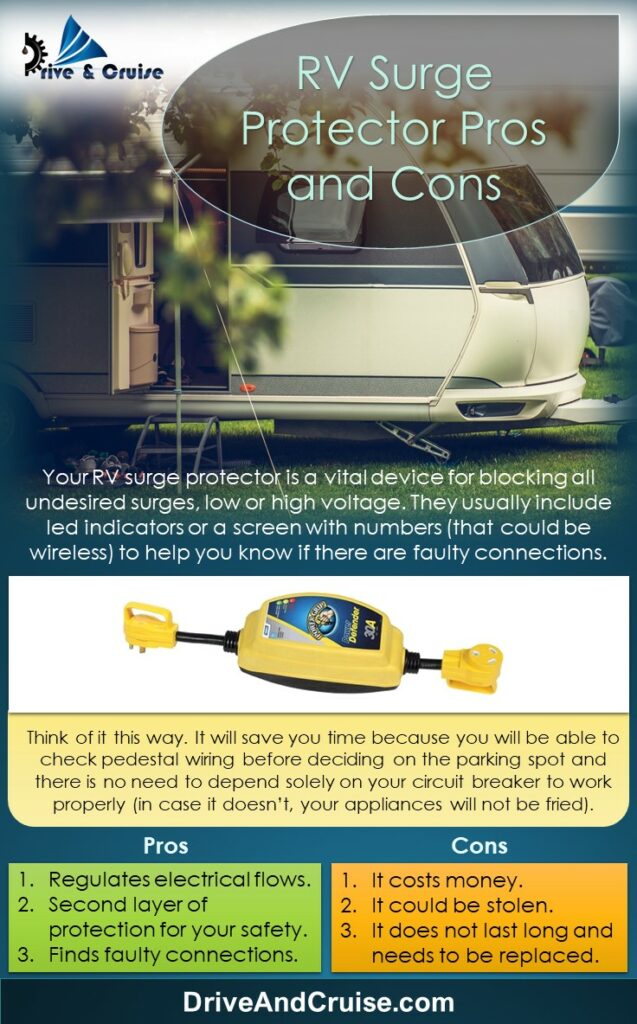![]()
RV Surge Protector Pros and Cons
DISCLAIMER: AS AN AMAZON ASSOCIATE I EARN FROM QUALIFYING PURCHASES. THIS POST CONTAINS AFFILIATE LINKS THAT WILL REWARD ME MONETARILY OR OTHERWISE WHEN YOU USE THEM TO MAKE QUALIFYING PURCHASES. FOR MORE INFORMATION, PLEASE READ MY EARNINGS DISCLAIMER.
|
No RV trip is fun without your electronics, onboard appliances, and entertainment system! Therefore, you may consider getting an RV surge protector to protect your valuable appliances and electronic devices from unexpected events that you have no control over.
One of the surge protector benefits (or pros) is that you never really know what type of voltage problem you may encounter at the RV campground. The biggest drawback to the surge protector (portable version), is that it can be stolen easily if not secured properly.
The problem with overvoltage is obvious, but there are also under-voltage issues, and checking different pedestals with your portable protector in order to find any wiring problems (before even parking there) is sure a time savior!
The right RV surge protector can help protect your electronic gadgets against power surges, voltages that are too high or too low, or any other power-related problems that may damage them and your RV electrical system as well.
There are different types of RV surge protectors which are broadly classified into:
- Hardwired
- Portable
You may consider using portable systems, as they are easy to move from one RV to the next. But this benefit can also be a drawback, as portable systems can be lost or stolen easily as well.
These systems also have sub-varieties according to your RV power levels and may range from 30-amp to 50-amp varieties. Therefore, your RV’s needs determine the surge protector power levels you choose.
For instance, 30-amp RV surge protectors are for RVs with a 30-amp power supply, while 50-amp RV surge protectors must be used for RVs wired for 50-amp power service. So, is having a surge protector for RV worth it? Here is a good video on that:
Beyond the obvious (protecting your investment from electrical spikes and surges), RV surge protectors have their benefits and drawbacks. Once you know what they are, deciding on whether to use a surge protector on your RV or not, will be a lot easier.
Pros (or benefits) of a surge protector
Besides detecting power issues with your shore power supply and risking having your electronic equipment fried due to incorrect wiring at the park, there are other benefits of having a surge protector as well:
- Regulates electrical flows. Surge protectors regulate the flow of electricity.
- The second layer of protection for your safety. Even though we don’t want to think of it, since we are NOT dealing with a reasonably stable electrical flow as we have in our homes, an overworked circuit beaker can go bad! In this case, without a surge protector, you are risking letting excess electricity through your wires and that is a fire hazard.
- Finds faulty connections. No RV park is perfect, they are just people who are trying to do their job. So before you trust an unknown electrician, it is your responsibility to check the outlet, in order for you to have a safe and happy camping experience with your family.
1. Electrical flow regulation
Your RV surge protector is a vital device for blocking all undesired surges, low or high voltage. It monitors, mediates, and buffers the electric flow from outlets and your RV system, thereby keeping out destructive power issues.
Typically, RV protectors made in the US will allow only 140V of power to enter your technological devices. So, when the power is lesser or higher, it keeps them out, averting all issues from dangerously low or high voltages.
** Important! It is always recommended (even in your owner’s manual) to check your RV receptacle before plugging your 30 amp or 50 amp service in! A surge protector will be of great service here, especially if it’s able to determine and alert you of “reverse polarity”, “reverse ground” or “open ground”, etc.
2. RV safety issues
While traveling in your RV, there are a few electricity-related risks that you always carry with you, such as the possibility of electric shocks, fire hazards from lightning strikes, and power-related problems. You may not think about them, but if it happens, it may be too late to change anything.
Your RV surge protectors minimize the dangers of this hazard by protecting against electrical instabilities, power surges that come from blackout recovery, and undervoltages as well. On rare occasions, the excess voltage may go through your wires during a lightning storm and do damage to your appliances or RV wiring systems.
Yes, these are rare events, but electricity “has a mind of its own” if not regulated properly, and you don’t want it to get out of hand. Many surge protectors also have safety features such as LED indicators (make sure you check it), emergency disconnect or loud alarms to quickly alert or avert danger.
3. Protection against bad wiring
RV surge protectors usually include led indicators or a screen with numbers (that could be wireless) to help you know if there are faulty connections. You will receive alerts when trying to hook your RV to an unregulated or broken outlet, as well as improper connections with your power source.
Cons (or drawbacks) of RV surge protectors
Of course, besides all the pros, you have some cons to worry about. But that does not mean that you don’t need a surge protector!
Even though it may give you some headaches in keeping it from stealing, for example, you will still reap more rewards by using one. So, what are our drawbacks of using a surge protector:
- It costs money. In this life, there is no such thing as “Something for nothing”. If you need protection, whether it’s house insurance or RV surge protector, you will need to part with some kind of money.
- It could be stolen. Yes, there are some weird people out there that have their eyes placed on your surge protector! But don’t let that stop you! If you make stealing your surge protector difficult enough, you have nothing to worry about. But just in case I would have a spare one in case of emergency. You never know why people do things, but your life doesn’t stop there and you still need protection.
- It does not last long and needs to be replaced. There is actually a good reason for that! It ABSORBED all the surges that would go to your electrical equipment otherwise! The word “thank you” here is more appropriate and yes, there is some money involved in order to get a new one. But was it worth it?
The biggest downside to RV surge protectors is that you will need to change them from time to time. They don’t last very long because they usually absorb unsafe voltages each time you use them. However, the number of months or years varies from one model to model.
Including some ideas on how to protect your RV’s surge protector. Some surge protectors come with a pre-built hoop, through which you can put a regular bike locking wire and seal it with a nice big lock:

Image source.
With others, you have to get creative:

Image source.
If you are still not comfortable with the idea that your important investment could be stolen, you could also have an electrician install a permanent surge protector inside your RV.
Feel free to save the infoPin below for your future Reference :30-amp surge protector for RV
How important it is to have a surge protector in RV? Good question! We all know about circuit breakers and fuses, and they are supposed to protect us in case of a problem.
Only imagine, you are watching a game on your TV and a circuit breaker pops! You miss the best part and this %#!@&% can happen at any moment, AGAIN!
When a fuse or breaker is triggered, this generally means that excess current already went through your wires, and the circuit was broken. But what if the breaker malfunctions and does not disconnect? As a result, your electronics and RV’s electrical system will get “fried” and replacement will be needed.
Interestingly enough, extreme surges are not usually the biggest problem for RVs (lightning rarely strikes shore power pedestal, although out there in the wild anything is possible…), but when ALL campground residents turn their A/C on at once, UNDERPOWER could be a major concern!
In the event of LOW voltage, your 30-amp surge protector (higher-end models, check specifications) should disconnect shore power from your appliance in order to avoid overheating and damage to your equipment. It should also reconnect when everything goes back to normal.
Having a surge protector in your RV will give you extra peace of mind when a thunderstorm hits, and believe me, it’s worth every penny. This particular surge protector from Southwire Company 44380 Surge Guard 30A (paid link) can protect you from overvoltage and under-voltage:
Surge protectors are very handy devices and if you need to check pedestal wiring when you arrive at your rest spot, it will give you all kinds of information about it:

Watch your Amps! … and get the right size surge protector! It is not recommended to buy an incompatible surge protector in order not to let the wrong amount of electricity through.
The surge protector needs to be the right size!
You should never use a 50-amp surge protector on a 30-amp RV or a 30-amp surge protector on a 50-amp RV. Such practices, especially when using a higher RV surge protector for a lower amp usage RV, may still cause damage to your electrical systems.
Better safe than sorry!
Do you really need an RV surge protector? It’s easy to get tempted to leave off the extra protection and save money. After all, you don’t always hear stories of people having damages to their electrical systems, especially at a high-quality developed campground.
Think of it this way. It will save you time because you will be able to check pedestal wiring before deciding on the parking spot and there is no need to depend solely on your circuit breaker to work properly (in case it doesn’t, your appliances will not be fried).
Are you willing to risk an expensive electrical system fix or damaged appliances before you finally go out and get one?
Even more, RV surge protectors are very affordable! If you compare the costs of your gadgets to the meager price of an RV surge protector, then you find that it is worth every cent.
This, very small investment, can keep you camping happily for a very long time, without ever exposing your RV or technological devices to unwanted situations. Whether you’re a renter or have your own rig, think seriously about purchasing an RV surge protector.
You will be thankful in the end. It’s a lot easier (and less expensive) to buy one little device than to change your electrical appliances or have to do repairs on your RV.

You can also search our database:
Attention! This article is for informational purposes ONLY and is NOT a replacement for professional advice! ALWAYS consult your local specialist for an appropriate solution to your problem. All statements, prices, contact information, recommendations, and reviews contained herein came from sources that we believe to be reliable, but the accuracy or completeness thereof is not guaranteed. Please contact the service provider for complete details and updates.




